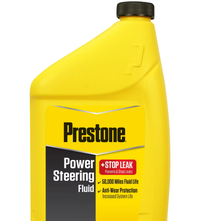 Yesterday morning on my way to work I noticed my truck making a moaning noise. The noise was quieter when driving and idling, but sounded like a baby calf crying for its mother when turning in either direction. Thinking it sounded like something with the truck’s power steering, I turned toward our household’s auto repair shop instead of making the turn to work. Once there, the mechanic confirmed my suspicions: It indeed sounded like something related to the power steering system. What that was couldn’t be determined by simply listening and taking a quick preliminary look. My truck would need to go in for an appointment, and he didn’t have any openings until the following week. At first glance, however, the mechanic did see that the power steering fluid level in the reservoir was low, so he went back into the shop, retrieved a funnel and some power steering fluid, filled the reservoir to the appropriate level, and the moaning stopped. My mechanic must know me well enough to know that I am skeptical of the quick fix because upon hearing the moaning cease, he looked at me and told me that topping off the fluid took care of the symptom, but not the problem itself. He couldn’t be sure where the fluid was going or what (if any) parts might be needed. All he could be sure of is that having the right amount of fluid was the best way to protect the power steering pump from burning up. With that, I followed him into the shop to make an appointment for the following week. And I wish I could have left it at that…but I couldn’t. I didn’t. Because as soon as I crawled back into my truck I was already asking Google what could be leaking in the power steering system and where the fluid could be leaking if not on the ground (at least not that I’ve noticed). On my lunch break and again in the evening, I feverishly searched the internet, YouTube videos, and Honda Ridgeline forums looking for answers to my power steering fluid woes. And I found answers…LOTS of answers. Maybe not to my specific problem, but to ALL KINDS of power steering problems and issues–with dollar amount estimates for the fixes ranging anywhere from $100 to thousands of dollars to fix. The more I found, however, the more I kept wanting to find. So I just kept looking. If you had asked me yesterday what I was looking for, I would have told you I was looking for THE answer. But I know now that because of my limited knowledge of vehicles (I mean, I can change the oil, change a tire, change the air filters, change headlight bulbs, and check for fluids, but not much beyond that) I wouldn’t necessarily know the answer if it hit me in the face. No, what I was looking for was certainty. I wanted to be certain of what was wrong. I wanted to be certain that we could afford to fix what was wrong. I wanted to be certain that we could handle whatever was coming our way. I don’t think I’m alone in this practice. A lot of us, I think, find ourselves in situations where we think we are looking for answers, but are really looking for certainty. We get our test results in the My Chart app before our appointment with the doctor to explain those results, and we feverishly begin “researching” online or among friends what those results mean. All the while being less concerned with the science of it, and more concerned with what it means for our lives, for the quality with which we live our lives, or for how long we might yet have with the one we love. Or we’re offered a different job within our organization, and we think taking that different job would be good for our careers and our bank accounts, but we aren’t sure how it would affect the rest of our lives. So we start polling our friends for feedback, and start looking up articles about what a good “work-life balance” looks like. We calculate how the salary increase would impact our 401k’s and if it will make it easier for us to retire. And we do all of this thinking that we are merely doing our due diligence so that we can make an informed decision, when what we’re really doing is hunting down certainty. We want to be certain that this new job won’t adversely affect our families. We want to be certain that the salary increase will be worth the increased stress. We want to be certain that we won’t come to regret the day that we agreed to accept the new role. The thing is, we’ll never find what we seek. Though we might fool ourselves from time to time, nothing is certain–at least, not certain in the way we are hoping for–and this leaves us vulnerable. As a general rule, we human beings don’t like feeling vulnerable. We don’t like feeling that there is much beyond our control and much that we don’t know. So we Google and research and poll our friends and family trying to keep ourselves from feeling vulnerability–thinking that somehow if we don’t feel vulnerable, we won’t actually be vulnerable. We won’t feel that pit in our stomachs that tells us we’re running out of options. Our brows won’t furrow with worry over what the next turn holds for us. We won’t feel as if we’re on a rollercoaster, barely able to breathe and on the verge of losing our lunch with every new obstacle we encounter in our path. I’m sad to break it to myself and to y’all that there is not enough control or certainty in the world that will allow us to outrun or out-research vulnerability. A great deal of our lives we are asked to take on faith. Not faith as in faking some sunny disposition that everything is going to be okay when every fiber in our being is screaming that it is not, but faith in its truest sense. Faith not for overcoming obstacles, but for experiencing them—all the way through (paraphrased quote from Richard Rohr). So between now and next week’s truck appointment, I’m going to work more on keeping the faith, and less on Google. I’m going to trust that this vulnerability might feel like it’s going to kill me, but it won’t actually. I’m going to focus my energies on what I can do, and work my hardest to leave the rest behind. I’m going to do what I can to experience this obstacle all the way through, and I’m going to invite you to join me in doing the same with obstacles of your own. Keeping the faith with you, Pr. Melissa 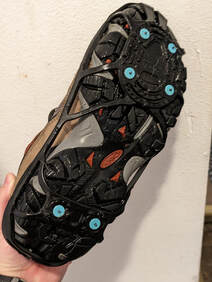 On Tuesday morning I had to go to the hospital to have some routine labs drawn prior to my annual physical. This is no big deal most of the time, but on Tuesday morning, a thin layer of ice had glazed the cement, making walking somewhat precarious. Wishing not to do damage to my body (or my ego) by falling, I dug out my ice cleats, strapped them on my shoes, and took off for the hospital. That’s the thing about falling: Once we’ve done it a time or two, we tend to take extra precautions to prevent it in the future because we know the cost of an untimely fall. A couple of years ago, I fell on our driveway while shoveling because I didn’t see the sheet of ice under the freshly fallen snow. I landed on what I now refer to as my “bad knee,” and cut the skin of my joint clean open. And that’s mild compared to other falls so many people in my life have had. This is why, I think, so many of us walk around like penguins in the wintertime–shuffling and waddling from our vehicles to our places of employment, the church, or back home at the end of the day. We would rather risk looking somewhat ridiculous than we would run the risk of falling and hurting ourselves and/or someone else near us. The only problem is, we don’t necessarily leave this approach to falling on the ice. It doesn’t take many years of living before each of us learns for ourselves what it feels like to fall: To fall in love, to fall out of love, to fall short, to fall apart, to fall from that pedestal our families have put us on, to fall from grace, to fall back, to fall in, or to fall behind. And after we fall a few times, we figure out that it doesn’t feel great to fall. In fact, we figure out that it doesn’t feel great to be in a place where there is even a risk of falling. And so we start shuffling and waddling through our lives–metaphorically wrapping ourselves in bubble wrap–convinced that with the right amount of protection, and the right amount of restraint, and the right amount of abstinence from risk, we will keep ourselves from falling. And if we can keep ourselves from falling–in all the ways that falling can and does happen–then we won’t get hurt. But the truth is that–in avoiding risk and avoiding the fall–we avoid some pretty great stuff too. We avoid the thrill that comes from falling in love. We avoid knowing what it’s like to have our friends catch us when we fall back or fall in or fall apart. We avoid the lessons that bring us to a place of deep knowing, like the truth that there is nowhere we can fall that grace cannot find us. Sure, we’d rather not fall, but what if falling is just part of living? I think sometimes we look at falling like it is somehow outside of the human experience…but what if it isn’t? What if falling is fully a part of what it means to be human? What if keeping ourselves from falling was never the point? What if the point is that life is risky and love is risky and we live and love anyway, knowing that when (not if) we fall it will likely hurt like hell, but the hurt will not have the final word. The hurt will not break us beyond repair…even if we walk with a limp for a while. I’m not sure how you answer those questions, but for me, the answer is that I would rather fall a million times in a million ways than to be walking around in bubble wrap all of the time–never risking, never trying and failing or trying and succeeding, never knowing the terrible and wonderful feeling that comes in the free fall just before hitting the ground. I would rather know beyond a reasonable doubt that I am not simply waddling and shuffling and calling it a life. How about you? Slipping, tripping, and falling my way toward being more fully human with you, Pr. Melissa 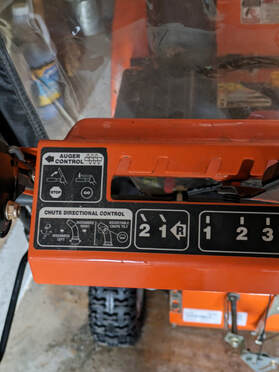 Most of Iowa spent the better part of last week dealing with around two feet of snow. Whether we or someone we hired shoveled it, blew it, threw it, or just sort of pushed it around with our car tires, we have all–in one way or another–contended with Mother Nature’s frozen gift that has kept on giving. Because of my spouse’s heart condition, I am the lone snow remover in our household. To help me out, I have a snowblower with a cab that I can take on and off (depending on whether or not I need it to protect me from the wind), and I have two different kinds of shovels: A metal snow pusher and a plastic snow scooper. In other words, as far as tools go, I am set up pretty well. I’m kind of an anxious snow remover…at least prior to going out to remove the snow. On snowy days I pace from window to window and door to door–listening for any sound of snow blowers or shovels in the distance–letting me know that it’s time to give into the neighborhood “peer pressure” and get outside. I watch the radar to see if there is going to be a break in the snow. I plot and plan how I’m going to blow the driveway, and where I’m going to try and place the snow. I him-haw about waiting for the snow to end versus blowing the drive and the walks while it’s still snowing just so that the piles don’t get too large. No matter the strategy, the snow always gets moved. The other day during one of my many snow removal sessions, I was blowing back snow into our yard while making sure there was a puppy area for our little dog Dexter. I would blow the snow forward, then put the blower in reverse and come back for another pass. As I was doing this, I noticed my back and my shoulder starting to hurt, which is something that doesn’t routinely occur when I use my blower. Then I realized that while the blower was in reverse, I was also pulling the machine–trying to go faster and harder than Reverse number 2 would go. Essentially, I was fighting the machine instead of letting it simply do the work. As I continued on, I thought about all of the times I have done something similar in other parts of my life: Making drastic changes in diet and exercise routines in order to see faster weight loss results; Painting with broad strokes in social activism–demanding sweeping changes all at once, in order to see the change I want more quickly; Bringing an “all or nothing” mentality to my relationships–insisting that things are done my way or no way at all. Over and over again I do this–fighting, instead of letting the food or the exercise or the changes or the compromise simply do their work. And over and over again, I find myself hurting because of it. Maybe you can relate? Good spiritual teachers say, “What you resist persists.” In other words, when I resist letting things work on their own timetable instead of my own, and when I resist the natural flow of relationships, and metabolism, and justice-making, that flow rages even harder. Or, as Richard Rohr says, “To actively oppose something actually engages with it and gives it energy.” The idea isn’t to simply adopt an “anything goes” mindset. The idea is to find balance–”neither clinging nor opposing”--as Rohr puts it. In terms of our metaphor, it isn’t to fight the snowblower doing the work in reverse, but neither is it to rely solely on the blower’s power alone. So maybe this week you can ponder with me what it is you’re fighting? What is it that you’re pushing to happen on your own timetable? Who is it that you are demanding see things your way immediately or sooner? Where is the resistance happening in your life? Are you resisting holding on? Are you resisting letting go? Are you resisting letting things fix themselves over time? Are you resisting the work it takes to fix something? Are you resisting movement? Are you resisting being still? Whatever it is for you, I pray that you might take some time this week to think about what it would look like to stop fighting. What would your life, and your health, and your relationships look like if you stopped resisting whatever it is you have been resisting? Perhaps we’d all hurt just a little less from trying to go harder and faster and our own way? I’m not sure, but I’m willing to try…how about you? Interrupting the persistence of resistance with you, Pr. Melissa  There are days when I am just “off.” Days when it feels like I read the same passages over and over again without really being able to comprehend what I just read. Days when every move I make during the day feels like it is being made in quicksand. Days when I’m tired and irritable despite having gotten a full night’s rest. Maybe you have those days too? Oftentimes, days like these cause me to want to shut myself up somewhere until I am once again fit for human consumption. I feel closed off internally and simply want to find a quilt, wrap myself up in it, and hide away with my dog nearby until whatever it is that has left me feeling this way subsides. For years I have judged myself for feeling this way. I have scolded myself and re-subscribed to the idea that “pulling myself up by my bootstraps” was the only way through. And yet, as hard as I pulled, some days those bootstraps just buckled under the weight of my being. Recently, during one of these days, from under my metaphorical quilt, I read a bit from Jesuit Paleontologist, Teilhard de Chardin. He spoke of the soul as a wondrous residence–this “hidden part of us that is in union with divinity, and is where our abundant goodness (or God-ness) exists.” Chardin believed it is necessary for us to open the door to our souls inward to find and claim this goodness. Once, when reflecting on his spiritual growth, Chardin observed: “The deeper I descend into myself, the more I find God at the heart of my being.” Truly, we all don’t have the time (or maybe even the patience) to pause long enough to deep dive into the wondrous, inner residence of our souls. But I do think we have what it takes to move through these “closed off” days in a different way. Perhaps instead of trying to power through or toughening up or shutting down completely, we might try something simple to open us–if not to the deepest part of ourselves–then simply to a place beyond where we currently are. Joyce Rupp, an author, speaker, member of the religious Order known as the Servites or Servants of Mary, and Des Moines, IA resident, proposes saying “A Prayer for Openness” in order to begin to peel back the corner of the quilt to get our minds, bodies, and souls back in connection with the One who lives and dwells in us. It is not a magic prayer that will change our “off” day into a day in which we’re suddenly and effortlessly fully “on” again. Instead, it is a prayer that helps put us in a posture of openness–gently nudging us beyond our judgments and our hustling–pointing us toward the God who dwells at the heart of our being: A Prayer for Openness Remember the Holy One is with you. Bring to mind this loving presence within you and around you as you pray the following:
Practicing openness–even from under “the quilt”–with you, Pr. Melissa 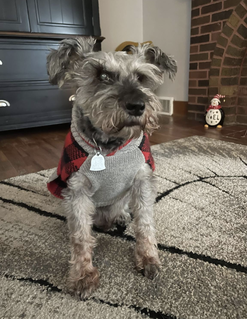 A few days ago, our very senior miniature schnauzer, Dexter, began having digestive issues. He got sick numerous times, and became more lethargic. We tried all of the home remedies we could think of, but they haven’t seemed to help. This morning (Tuesday) was the first morning our vet was open in 2024. As soon as I could, I called in and explained the situation to them. They had a few more things for us to try at home with Dexter before they said he needs to be seen. So, I went across town and picked up special food, some probiotic packets, and two digestive support gels in pre-measured syringes. All of it feeling a lot like a Hail Mary intervention. As I write this (and even as you read this), I have absolutely no idea whether or not the interventions given to us by the vet will work. I have no idea whether or not Dexter will bounce back just one more time. I have no idea whether or not he is suffering. All I know is that we have to wait and see and field whatever comes our way. This, I am not so good at doing…maybe you aren’t either? As I walked this morning and as I have been out and about today in the truck, I haven’t been able to avoid all of the new year-focused news stories promising that this new year can bring about a “new you,” and that all has been made new by the simple flipping of the calendar. But Dexter isn’t shiny and new…and neither am I. The same problems that plagued Dexter at the end of 2023 are plaguing him still. I still have my same insecurities, my same hangups and health issues. I still get hurt by the same things and sometimes even the same people. My blonde-ish hair still hides the gray that’s beginning to appear in it, and I’m still worried about the people I love the most in this world. There is nothing about this new year that feels new…besides maybe the newness of having to write 2024 instead of 2023 on documents now. For some of us, this sameness is a surprise, particularly in the face of all the world’s focus on all things being new. But for contemplatives and those who practice contemplative prayer, the sameness is part of God’s unveiling. It is to say, “This is what IS now,” while leading us toward the question, “What does this have to say to me?” The sameness asks us to listen more deeply to our lives to learn what it has to teach us–just as it IS, not as we wish it to be. It is, Richard Rohr says, an invitation to look at the circumstances of our lives here and now–and not the changing of the calendar–and inquire, “What’s the message or gift in this for me? How is God in this event? Where is God in this suffering?” The changing of the calendar year isn’t a magical time when everything is shiny and new. Despite what the song says, old acquaintances actually aren’t forgotten and never brought to mind. Everything–including us and our dogs–are the same…until we aren’t. Until God’s new thing is unveiled to us, in us, and through us. Which is good news, I think, for those of us prone to hustling–trying to become something we are not yet or maybe will never be. We don’t have to feel like new year failures because we are the same as we were just days ago last year. We can settle in and trust that–if we’re willing to stare deeply into the circumstances of our lives–we will see a new message and receive new insight on how God is showing up…even in our uncertainties…even in our suffering. It’s not an “all at once” kind of thing. It’s a little at a time. Over and over again. The gift that truly keeps on giving all year round. Or as Paul writes in 1 Corinthians 13:12, “For now we see through a glass, darkly, but then face to face. Now I know in part, but then I shall know fully, as I am fully known.” That’s not a promise just for the new year or even for the end of our lives…it’s a promise for right now too. Hold onto that promise, and maybe let the high ideals of the new year go. God is at work...always and already God is at work. On the journey toward knowing with you, Pr. Melissa |
Rev. Melissa Sternhagen
Rev. Melissa Sternhagen was called as the pastor of St. Paul Congregational UCC in June of 2020. Prior to her call to St. Paul, Pr. Melissa worked as a hospice chaplain in the Ames, IA area, following pastorates at rural churches in Central Iowa and Southern Illinois. Pr. Melissa is a second-career pastor with a background in agribusiness and production & supply operations. She received her M.Div. from Eden Theological Seminary in St. Louis, MO, and holds a MA Ed. in Adult Education and Training, and a BA in Organizational Communications. Archives
July 2024
Categories |
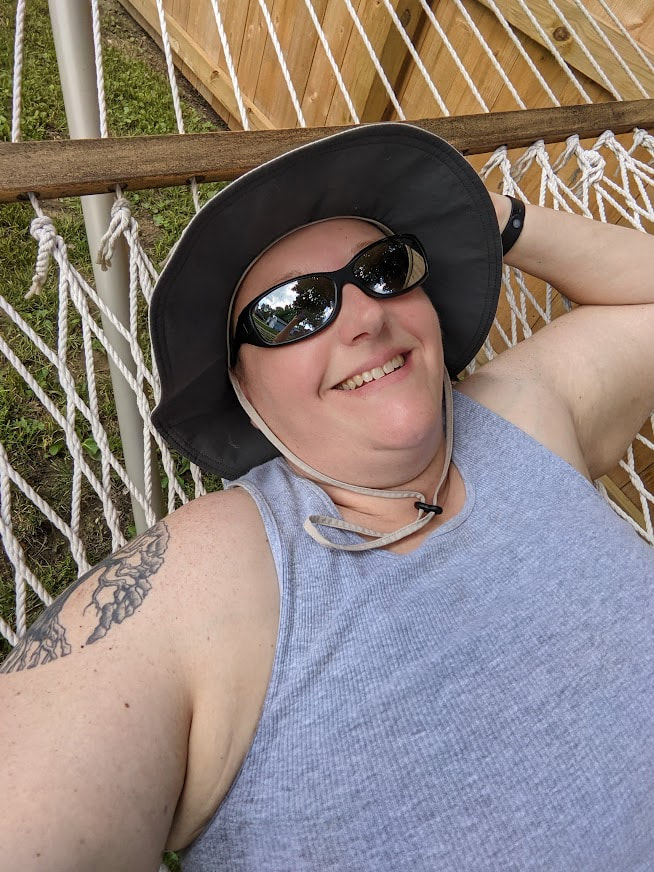
 RSS Feed
RSS Feed
